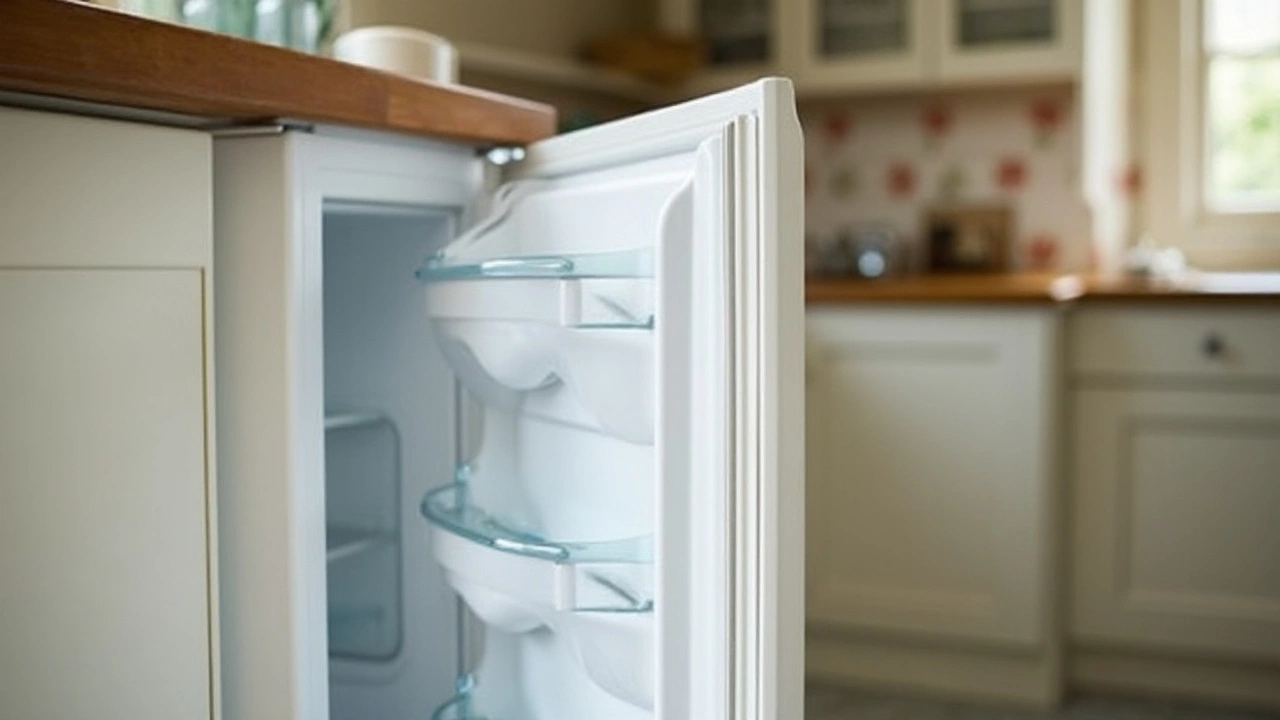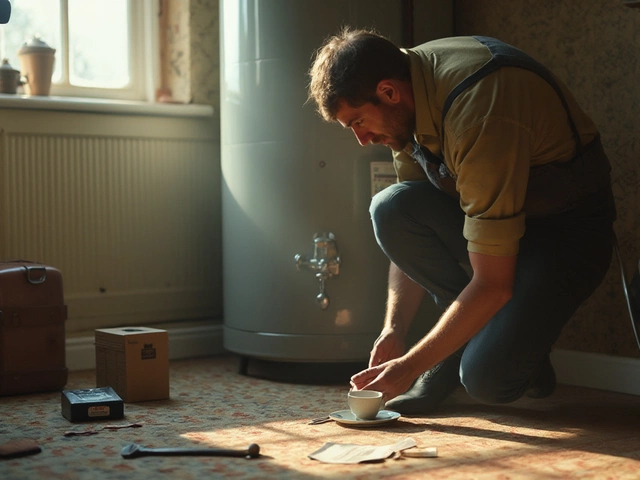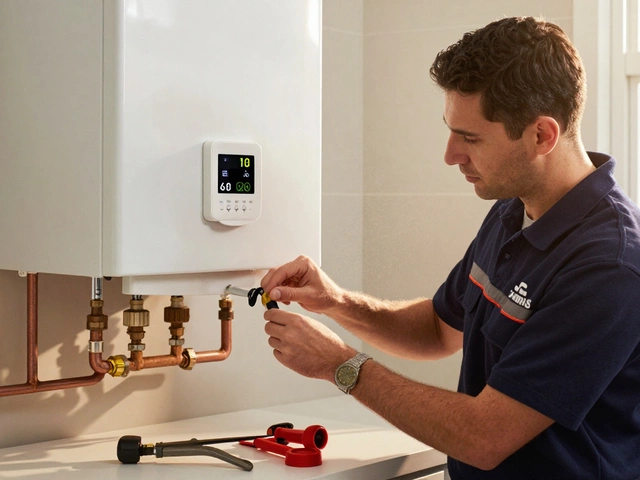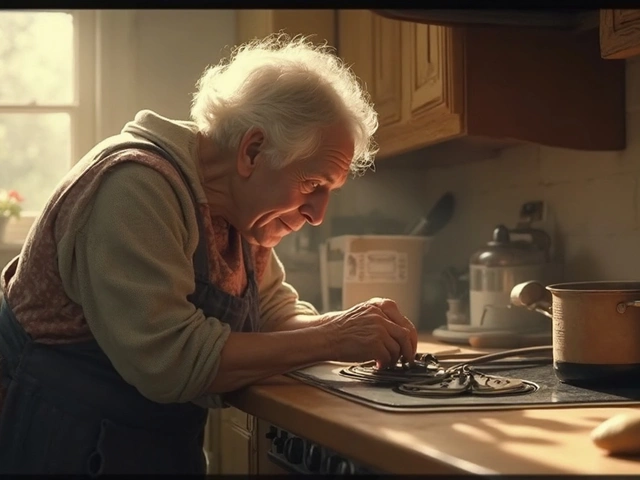Let's face it, dealing with a freezer that won't freeze can be quite a hassle. You've bought all those groceries expecting them to stay fresh and frozen, but instead, they end up in a slushy mess. Frustrating, right?
In this piece, we'll unravel the mysteries behind why your freezer might be giving you the cold shoulder—in the worst possible way. Whether it’s a dodgy seal that's letting all the cold air escape, or if your appliance simply needs a bit of a declutter, we've got the tips and tricks you need to fix it yourself. Sometimes, small adjustments and regular maintenance can keep your freezer performing like a champ.
However, not every issue can be sorted with DIY efforts. We’ll also guide you on when it’s time to ring up the pros for a visit. So, stay with us as we dive into the common culprits of freezer woes and empower you with the knowledge to tackle these icy problems head-on.
- Understanding Freezer Mechanics
- Common Causes of Freezer Malfunction
- Do-It-Yourself Checks and Fixes
- When to Call a Professional
- Preventative Measures for a Healthy Freezer
Understanding Freezer Mechanics
Let's begin by unraveling the icy world of freezers and how they work to keep your food safe. At its core, a freezer is simply a large, insulated box that relies on a steady state of cold air circulation to maintain the low temperatures necessary for freezing food. A typical household freezer operates around -18°C (0°F), which halts the growth of most bacteria, ensuring your food remains fresh for extended periods. The main components that drive this process are the compressor, condenser coils, evaporator coils, and the thermostat, all working in harmony to keep the interior frosty.
The compressor is often considered the heart of the refrigeration process. It compresses the refrigerant, which is a specialized fluid that undergoes intense pressure changes, transforming it from a gas to a liquid. As the refrigerant moves through the condenser coils, the heat absorbed inside the freezer is expelled into the environment, a crucial step for maintaining a cool interior. You'll usually find these coils at the back or the bottom of your freezer. They facilitate the transfer of heat effectively, making them essential for the appliance's functionality.
Once the refrigerant sheds its heat, it moves into the evaporator coils, commonly hidden behind one of the freezer's panels. Here, it evaporates into a gas, absorbing heat from the freezer compartment, thus lowering the temperatures within. Occasionally, frost may build up on these coils, obstructing air flow. A defrost cycle, typically automatic in modern units, helps prevent this accumulation, ensuring the freezer remains efficient. The thermostat's role is to sense temperature changes, triggering the cooling process when needed to maintain the desired freezer conditions.
"A well-functioning freezer is not just about keeping things cold; it’s about having a reliable system that prevents spoilage and food waste," says James Miller, a leading refrigeration specialist.
It's important to remember that a certain amount of airflow is vital within a freezer. Proper circulation prevents uneven cold spots and helps the compressor function efficiently. This means not cramming your freezer to the brim, as overcrowding can reduce the effectiveness of these mechanics. Just as you engineer airflow in a room by arranging furniture wisely, maintaining space between items inside is crucial for any appliance functioning effortlessly. It's always helpful to understand the basic principles behind these household staples, as it can enable you to diagnose issues quickly and identify whether the problem is something simple or which needs a trained professional.
To sum up, grasping how your freezer works and its critical components empowers you to recognize telltale signs of malfunction. Whether it's the humming sound of the compressor beginning to fade or the unusual warmth of food that should be solid as a rock, these are signals that something’s amiss. Equipped with this knowledge, it's possible to maintain optimal function and tackle issues head-on before they escalate into more costly repairs or replacements.
Common Causes of Freezer Malfunction
When your freezer isn't keeping things as cold as it should, it can be a challenge to figure out the problem. The good news is that there are quite a few usual suspects we can look into. One of the first to consider is the door seal, also known as the gasket. If this part is worn out or broken, it might not be closing properly, letting the cold air escape and warm air seep in. This leads to inadequate freezing. Cleaning the gasket routinely and ensuring there isn’t any food debris stuck can prolong its life and efficiency. Another culprit could be a blocked airflow. Your freezer relies on a steady circulation of cold air. If you have piles of food crammed inside, it can obstruct these air passages, causing sections to become warmer than others.
The next thing on the checklist should be checking the condenser coils. These coils are critical in dissipating heat but can often get clogged with dust or pet hair if not regularly cleaned. Dirty coils can't release heat properly, leading to your freezer having a tough time maintaining the right temperature. Using a vacuum or a brush to clean them every few months can prevent this issue from escalating. It might seem like a small detail, but regular maintenance of these components can save you a lot of headaches down the line. Additionally, issues like a faulty thermostat can also sneak under the radar. The thermostat controls how cold your appliance should be, and if it isn’t working properly, your freezer might not get the message to chill.
Sometimes the problem might be hidden, like refrigerant leaks, which can seriously affect the cooling efficiency. Refrigerant is the lifeblood of the cooling process, and any leaks reduce the system's ability to maintain the low temperatures needed. Let’s not forget about the evaporator fan motor. It’s responsible for circulating air through the freezer and the entire fridge. If you hear humming or whirring but your freezer isn’t cold enough, this motor might be at fault. Regular checks and listening for unusual sounds can be beneficial. In terms of operational vehicle components, problems with the timer or electronic control board cannot be overlooked either. They might be rare, but when they do occur, they can throw the whole cooling process into disarray.
"A little maintenance can prevent major repair costs down the line. Keeping these areas in check is not just about saving money but also prolonging the life and efficiency of your appliances," says Julie Harrison, an expert appliance technician at CoolTech Solutions.
No less troublesome are power issues. It might sound straightforward, but check to ensure the freezer is plugged in, and the outlet is functioning correctly. A blown fuse or tripped breaker could be cutting off the power supply without you noticing. Thus, the freezer appears on but is not functioning correctly. For those living in areas with frequent electrical fluctuations, a surge protector might be a good investment. Such details might seem trivial, but they play a huge role in keeping your freezer in top-notch condition. Remember, most of these issues not only affect how well your freezer works but can also elevate energy consumption, causing your electricity bills to skyrocket.
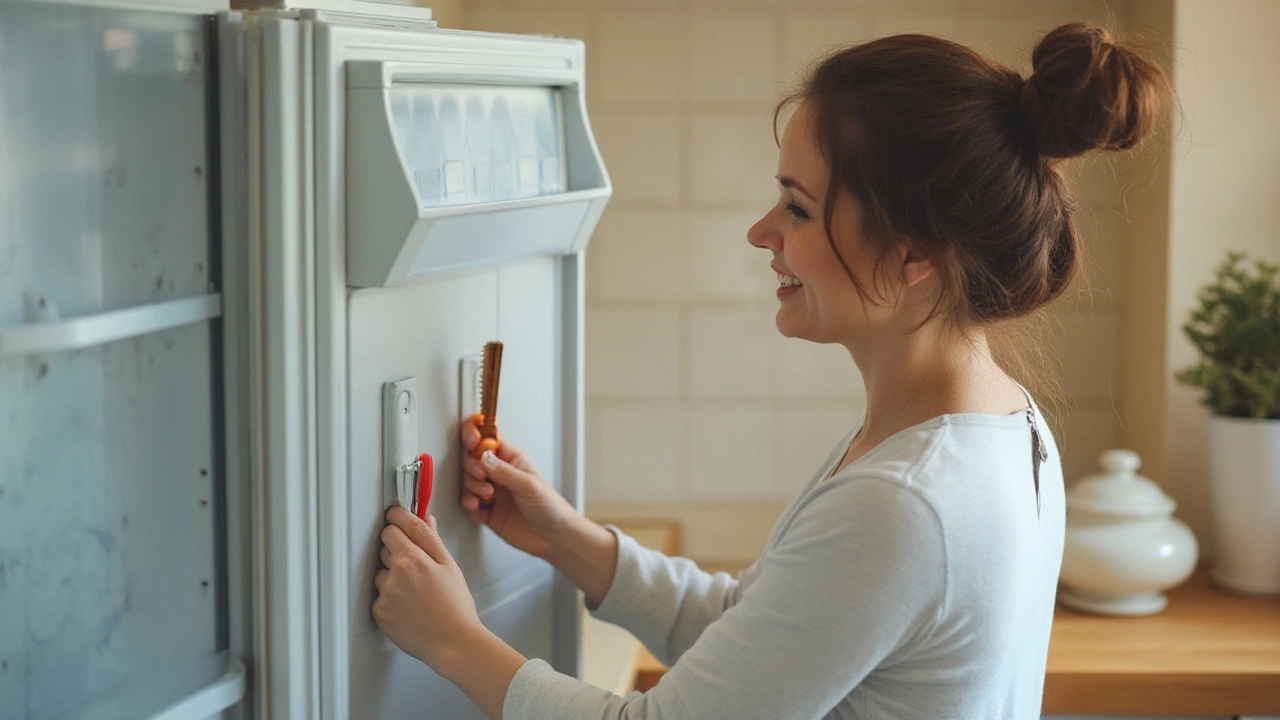
Do-It-Yourself Checks and Fixes
When your freezer stops living up to its name, it might tempt you to start exploring costly replacements, but hold your horses! The root of the problem could be much simpler than you think, and with a bit of elbow grease, you might get things back on track yourself. Many issues stem from neglected maintenance or small overlooked details. The first step is understanding what could go wrong and how to resolve it. It's surprising how often a basic fix can do wonders. For instance, if you're questioning why the appliance is warmer than it should be, check its setting. The internal dial should be set between 0 to 5 degrees Fahrenheit. A mere nudge can change everything. Don't forget to plug it in right after adjusting, ensuring it chills correctly as it should.
Next, focus on the freezer's content organization. Believe it or not, overcrowding can block air circulation, straining your appliance and preventing it from freezing your groceries. Prioritize tidying up the inside, especially around air vents, which should be unblocked. Repeat this process every few months for optimal performance. The environment outside the freezer matters too. Make sure it isn't sitting next to a heat-producing appliance like an oven or direct sunlight. Excess heat around the freezer can cause inefficiency and disrupt normal cooling. Keep in mind, placement is crucial; about three inches of space behind the freezer helps the coils work better.
Another crucial component to evaluate is the door seal, sometimes called the gasket. These seals can wear out, letting cold air seep out and lead to potential problems. Here's a quick and simple test: use a thin piece of paper, close the door on it, and try pulling it out. If it slides effortlessly, it's seal-check time. You might want to clean it with warm, soapy water first, as grime can affect the seal's performance. If cleaning doesn't do the trick, a replacement might be necessary. This sound intimidating, but fear not! Most brand websites offer straightforward walk-throughs on seal replacement specific to their models.
Quick DIY Solutions
Finally, if your freezer still acts up, it may be time to give those condenser coils a look. These coils are critical in dissipating heat, and when they get dusty, they lose efficiency. Plan to vacuum or brush off the dust from these coils, situated either at the back or beneath the unit, twice a year. Yet, tread carefully to avoid damage. You’ll be amazed by the results after such a simple acting cleaning session.
"Regular maintenance of appliances can extend their lifespan and save up to 30% on energy bills," says the Australian Energy Regulator.
Implement these checks and fixes, and your appliance may not only freeze like new but save some energy costs too. DIY fixes are empowering, and by keeping these pointers in mind, you'll handle everyday issues like a pro. You get the satisfaction of fixing it yourself, while your food stays as cold as it should be.
When to Call a Professional
Sometimes, despite our best efforts, a malfunctioning freezer can leave us scratching our heads. While DIY fixes can resolve many minor issues, there are certain red flags that suggest it’s time to call in a professional. Ignoring these signs not only risks food spoilage but can also escalate the problem, leading to more costly repairs down the line.
If your freezer stops freezing altogether, despite attempts to adjust the settings, it might be facing a more complicated issue like a faulty thermostat or damaged compressor. These components are crucial for maintaining the desired temperature, and they require specialized tools and expertise to repair. Additionally, strange noises emanating from your appliance could point to mechanical failures, such as worn-out motors or fan issues, which can best be handled by a trained technician. Unusual sounds aren't just a nuisance but often signal a serious underlying problem that could affect the entire cooling system.
Moreover, persistent temperature fluctuations that defy explanation should prompt a professional assessment. A certified repair person can accurately diagnose whether there’s a defect in the cooling system or an issue with the coolant itself. Sometimes, the freezer might develop ice buildups or leaks, hinting at possible breaches in its internal mechanisms. Addressing such leaks generally involves handling refrigerants, which should always be performed by someone with the appropriate certification and experience.
"Attempting to replace a faulty compressor or recharge refrigerant without proper training can lead to potential safety hazards," warns Alex Jenson, an experienced appliance engineer. "It’s not just about fixing the freezer; it’s about doing it safely and effectively."
Another crucial aspect involves the electrical components of your freezer. If your unit frequently trips fuses or displays signs of electrical faults, it could be signaling an underlying electrical issue that requires prompt attention from an electrician specialized in appliance repair. Handling electrical components without proper care can lead to severe consequences, including the risk of electric shock or fire.
Lastly, if every avenue has been explored and yet the issue persists, or seems beyond your comfort level to fix, it’s always wise to rely on professional help. Professionals can often spot problems that aren’t immediately visible and provide solutions that rest assured will keep your appliance running smoothly. They also have access to manufacturer-specific parts and tools that might not be available to the general public, ensuring your freezer repair is both accurate and durable.
In some instances, prevention might just lie in routine checks and servicing facilitated by professionals. Regular maintenance can identify potential issues before they become big headaches, saving you both time and money. While it might seem unnecessary when everything appears to be working fine, scheduled professional evaluations can extend the life of your appliance and offer peace of mind.

Preventative Measures for a Healthy Freezer
Keeping your freezer functioning optimally is not just about repairing it when things go wrong. It's also about taking preventative measures that help maintain its health. A well-maintained appliance runs efficiently, extends its life span, and saves you money in the long run. So, how do you ensure your freezer stays in tip-top shape?
Firstly, always be mindful of the freezer not freezing when it's overloaded. Cramming it full might seem efficient, but air needs space to circulate. An evenly distributed load that's not overcrowded ensures consistent cooling across all areas of the freezer. Occasionally reorganize its contents to ensure proper airflow. On the other hand, leaving it too empty can make it work overtime, expending unnecessary energy. Striking a balance is key.
Next, regularly check the appliance's door seals. A leaky gasket is one of the top reasons behind temperature fluctuations. You can perform a simple test with a piece of paper—close it in the door and see if you can pull it out easily. If the paper slides out without resistance, it’s time to clean the seal or consider a replacement. A good seal ensures cold air stays in, keeping your freezer energy-efficient.
Routine cleaning is also vital. Dust and debris can clog the condenser coils, making the freezer work harder and raising energy bills. Experts suggest cleaning these coils at least twice a year. Additionally, unplugging and defrosting the unit occasionally, especially if you notice a build-up of ice, can prevent strain on the motor.
Consider setting the freezer to the right temperature. Experts advise maintaining a temperature of around -18°C (0°F) for optimal food preservation. Keep a thermometer inside your freezer to monitor this. Sometimes, fluctuations in home temperature or power outages can lead to discrepancies, so regular checks ensure accuracy and efficiency.
Energy-Saving Tips
Investing in an Energy Star-rated appliance is a savvy move, as these models are designed to use less power without compromising on performance. Did you know energy-efficient freezers can save you up to 10% on utility bills annually? Ensuring your freezer is placed in a cool environment, away from direct sunlight and heat-producing appliances, also supports its efficiency.
Professional Maintenance
Lastly, don’t shy away from professional maintenance. An annual check-up can pinpoint issues before they escalate. Surprisingly, just like a regular car service, this can vastly enhance the appliance's longevity and efficiency.
"An ounce of prevention is worth a pound of cure." — Benjamin Franklin's timeless advice holds true even for household appliances.
